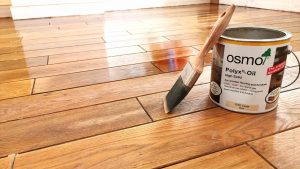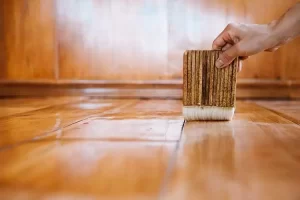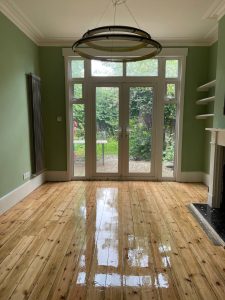The Difference Between Water-Based and Oil-Based Finishes

Choosing the Best Finish for Your Wooden Floors in Your London Home
Introduction
When it comes to finishing your wooden floors, the choice between water-based and oil-based finishes can significantly impact the appearance and durability of your floors. Understanding the differences between these two types of finishes will help you make an informed decision for your London home. This guide explores the key characteristics, benefits, and considerations of water-based and oil-based finishes.
Water-Based Finishes

Water-based finishes are becoming increasingly popular due to their environmental benefits and quick drying times. Here are the main features of water-based finishes:
- Appearance: Water-based finishes are clear and do not yellow over time, preserving the natural colour of the wood. They provide a sleek, modern look with a low to medium sheen.
- Drying Time: These finishes dry quickly, typically within 2-4 hours, allowing for multiple coats to be applied in a single day.
- Odour: Water-based finishes have a low odour, making them more pleasant to work with and safer for indoor air quality.
- Durability: While water-based finishes are durable, they may not be as robust as oil-based finishes in high-traffic areas. However, they are more resistant to scratches and dents.
- Environmental Impact: Water-based finishes have lower volatile organic compound (VOC) levels, making them a more environmentally friendly choice.
Oil-Based Finishes

Oil-based finishes have been a traditional choice for wooden floors due to their rich appearance and durability. Here are the main features of oil-based finishes:
- Appearance: Oil-based finishes impart a warm, amber hue to the wood, enhancing its natural grain and colour. They tend to darken over time, adding a classic, aged look.
- Drying Time: These finishes take longer to dry, usually 8-24 hours per coat. This longer drying time can be beneficial for achieving a smooth, even finish.
- Odour: Oil-based finishes have a strong odour due to higher VOC levels, which can linger for several days after application.
- Durability: Oil-based finishes are highly durable and can withstand heavy foot traffic and wear. They are ideal for areas with high usage, such as hallways and living rooms.
- Environmental Impact: The higher VOC content in oil-based finishes makes them less environmentally friendly. Adequate ventilation is necessary during application to mitigate health risks.
Comparison and Considerations
When choosing between water-based and oil-based finishes, consider the following factors:
- Project Timeline: If you need a quicker turnaround, water-based finishes are the better option due to their fast drying times.
- Desired Appearance: For a clear, natural look, water-based finishes are ideal. For a warm, rich tone, oil-based finishes are preferable.
- Environmental Concerns: Water-based finishes are more eco-friendly, with lower VOC levels, making them a healthier choice for indoor air quality.
- Durability Needs: In high-traffic areas, the superior durability of oil-based finishes may be beneficial, despite the longer drying time and stronger odour.
- Maintenance: Consider the long-term maintenance and potential for yellowing or darkening over time with oil-based finishes.
Conclusion
Both water-based and oil-based finishes offer unique advantages for wooden floors. Your choice will depend on your specific needs, preferences, and the conditions of your home. By understanding the differences between these finishes, you can make an informed decision that enhances the beauty and longevity of your floors. For expert advice and professional floor finishing services in London, contact us today. Let us help you achieve the perfect finish for your wooden floors.




How to Deal with High Traffic Areas on Sanded Floors
How to Deal with High Traffic Areas on Sanded Floors Protect and Maintain[Read more...]
How to Fix Uneven Floorboards Before Sanding
How to Fix Uneven Floorboards Before Sanding Ensure a Smooth, Professional Finish for Your[Read more...]
How to Achieve a Smooth Finish on Your Sanded Floors
How to Achieve a Smooth Finish on Your Sanded Floors Expert Tips for Professional-Quality[Read more...]
How to Spot Signs That Your Floors Need Sanding
Maintain the Beauty of Your London Home with Expert Tips Introduction Wooden floors add[Read more...]
Modern Wood Finishing: Key Findings for Protecting Your Floors
Modern Wood Finishing: Key Findings for Protecting Your Floors At Alchemist Floor Sanding, we[Read more...]
Understanding Grit Sequences in Floor Sanding
Understanding Grit Sequences in Floor Sanding Achieving the Perfect Finish for Your London Home[Read more...]
Dealing with Dust: Floor Sanding and Clean-Up Tips
Dealing with Dust: Floor Sanding and Clean-Up Tips Ensure a Clean and Healthy Environment[Read more...]
Can You Sand Bamboo Floors? What You Need to Know
Can You Sand Bamboo Floors? What You Need to Know Expert Tips for Maintaining[Read more...]
How to Choose the Best Floor Sanding Products
How to Choose the Best Floor Sanding Products Essential tips for selecting high-quality sanding[Read more...]
The Benefits of Reclaimed Wood Floors and Sanding
The Benefits of Reclaimed Wood Floors and Sanding Your guide to sustainable and stylish[Read more...]